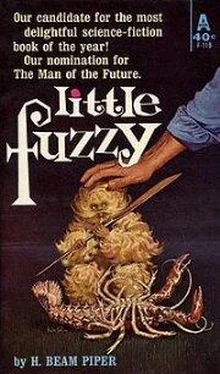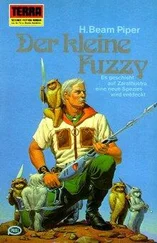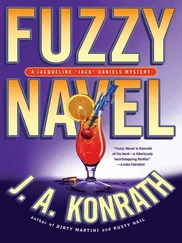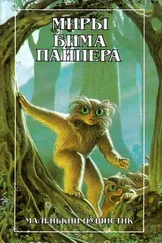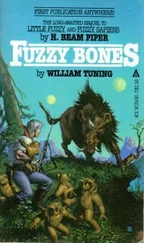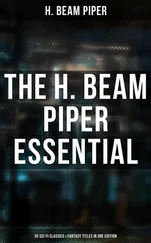Little Fuzzy
by H. Beam Piper
JACK HOLLOWAY FOUND himself squinting, the orange sun full in his eyes. He raised a hand to push his hat forward, then lowered it to the controls to alter the pulse rate of the contragravity field generators and lift the manipulator another hundred feet. For a moment he sat, puffing on the short pipe that had yellowed the corners of his white mustache, and looked down at the red rag tied to a bush against the rock face of the gorge five hundred yards away. He was smiling in anticipation.
“This’ll be a good one,” he told himself aloud, in the manner of men who have long been their own and only company. “I want to see this one go up.”
He always did. He could remember at least a thousand blast-shots he had fired back along the years and on more planets than he could name at the moment, including a few thermonuclears, but they were all different and they were always something to watch, even a little one like this. Flipping the switch, his thumb found the discharger button and sent out a radio impulse; the red rag vanished in an upsurge of smoke and dust that mounted out of the gorge and turned to copper when the sunlight touched it. The big manipulator, weightless on contragravity, rocked gently; falling debris pelted the trees and splashed in the little stream.
He waited till the machine stabilized, then glided it down to where he had ripped a gash in the cliff with the charge of cataclysmite. Good shot: brought down a lot of sandstone, cracked the vein of flint and hadn’t thrown it around too much. A lot of big slabs were loose. Extending the forward claw-arms, he pulled and tugged, and then used the underside grapples to pick up a chunk and drop it on the flat ground between the cliff and the stream. He dropped another chunk on it, breaking both of them, and then another and another, until he had all he could work over for the rest of the day. Then he set down, got the toolbox and the long-handled contragravity lifter, and climbed to the ground where he opened the box, put on gloves and an eyescreen and got out a microray scanner and a vibrohammer.
The first chunk he cracked off had nothing in it; the scanner gave the uninterrupted pattern of homogenous structure. Picking it up with the lifter, he swung it and threw it into the stream. On the fifteenth chunk, he got an interruption pattern that told him that a sunstone — or something, probably something — was inside.
Some fifty million years ago, when the planet that had been called Zarathustra (for the last twenty-five million) was young, there had existed a marine life form, something like a jellyfish. As these died, they had sunk into the sea-bottom ooze; sand had covered the ooze and pressed it tighter and tighter, until it had become glassy flint, and the entombed jellyfish little beans of dense stone. Some of them, by some ancient biochemical quirk, were intensely thermofluorescent; worn as gems, they glowed from the wearer’s body heat.
On Terra or Baldur or Freya or Ishtar, a single cut of polished sunstone was worth a small fortune. Even here, they brought respectable prices from the Zarathustra Company’s gem buyers. Keeping his point of expectation safely low, he got a smaller vibrohammer from the toolbox and began chipping cautiously around the foreign object, until the flint split open and revealed a smooth yellow ellipsoid, half an inch long.
“Worth a thousand sols — if it’s worth anything,” he commented. A deft tap here, another there, and the yellow bean became loose from the flint. Picking it up, he rubbed it between gloved palms. “I don’t think it is.” He rubbed harder, then held it against the hot bowl of his pipe. It still didn’t respond. He dropped it. “Another jellyfish that didn’t live right.”
Behind him, something moved in the brush with a dry rustling. He dropped the loose glove from his right hand and turned, reaching toward his hip. Then he saw what had made the noise, a hard-shelled thing a foot in length, with twelve legs, long antennae and two pairs of clawed mandibles. He stooped and picked up a shard of flint, throwing it with an oath. Another damned infernal land-prawn.
He detested land-prawns. They were horrible things, which, of course, wasn’t their fault. More to the point, they were destructive. They got into things at camp; they would try to eat anything. They crawled into machinery, possibly finding the lubrication tasty, and caused jams. They cut into electric insulation. And they got into his bedding, and bit, or rather pinched, painfully. Nobody loved a land-prawn, not even another land-prawn.
This one dodged the thrown flint, scuttled off a few feet and turned, waving its antennae in what looked like derision. Jack reached for his hip again, then checked the motion. Pistol cartridges cost like crazy; they weren’t to be wasted in fits of childish pique. Then he reflected that no cartridge fired at a target is really wasted, and that he hadn’t done any shooting recently. Stooping again, he picked up another stone and tossed it a foot short and to the left of the prawn. As soon as it was out of his fingers, his hand went for the butt of the long automatic. It was out and the safety off before the flint landed; as the prawn fled, he fired from the hip. The quasi-crustacean disintegrated. He nodded pleasantly.
“Ol’ man Holloway’s still hitting things he shoots at.”
Was a time, not so long ago, when he took his abilities for granted. Now he was getting old enough to have to verify them. He thumbed on the safety and holstered the pistol, then picked up the glove and put it on again.
Never saw so blasted many land-prawns as this summer. They’d been bad last year, but nothing like this. Even the old-timers who’d been on Zarathustra since the first colonization said so. There’d be some simple explanation, of course; something that would amaze him at his own obtuseness for not having seen it at once. Maybe the abnormally dry weather had something to do with it. Or increase of something they ate, or decrease of natural enemies.
He’d heard that land-prawns had no natural enemies; he questioned that. Something killed them. He’d seen crushed prawn shells, some of them close to his camp. Maybe stamped on by something with hoofs, and then picked clean by insects. He’d ask Ben Rainsford; Ben ought to know.
Half an hour later, the scanner gave him another interruption pattern. He laid it aside and took up the small vibrohammer. This time it was a large bean, light pink in color. He separated it from its matrix of flint and rubbed it, and instantly it began glowing.
“Ahhh! This is something like it, now!”
He rubbed harder; warmed further on his pipe bowl, it fairly blazed. Better than a thousand sols, he told himself. Good color, too. Getting his gloves off, he drew out the little leather bag from under his shirt, loosening the drawstrings by which it hung around his neck. There were a dozen and a half stones inside, all bright as live coals. He looked at them for moment, and dropped the new sunstone in among them, chuckling happily.
VICTOR GREGO, LISTENING to his own recorded voice, rubbed the sunstone on his left finger with the heel of his right palm and watched it brighten. There was, he noticed, a boastful ring to his voice — not the suave, unemphatic tone considered proper on a message-tape. Well, if anybody wondered why, when they played that tape off six months from now in Johannesburg on Terra, they could look in the cargo holds of the ship that had brought it across five hundred light-years of space. Ingots of gold and platinum and gadolinium. Furs and biochemicals and brandy. Perfumes that defied synthetic imitation; hardwoods no plastic could copy. Spices. And the steel coffer full of sunstones. Almost all luxury goods, the only really dependable commodities in interstellar trade.
Читать дальше
